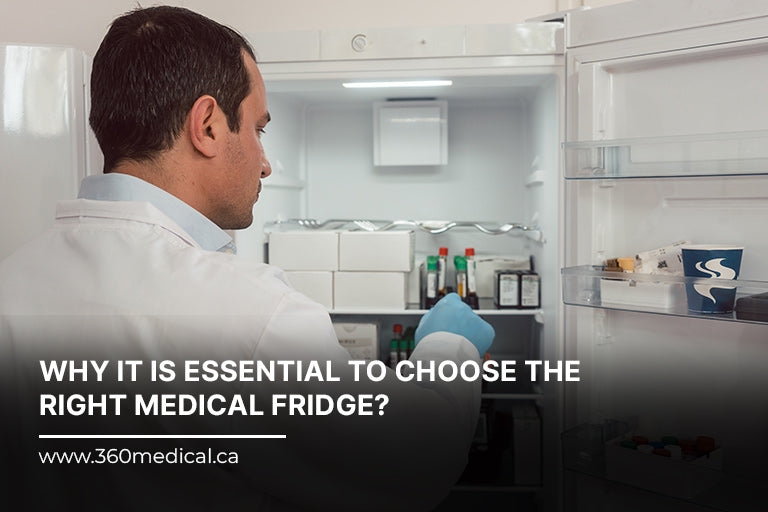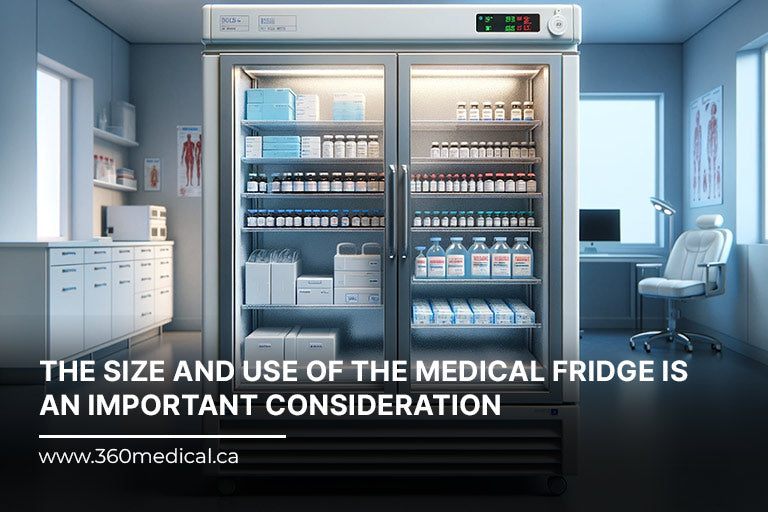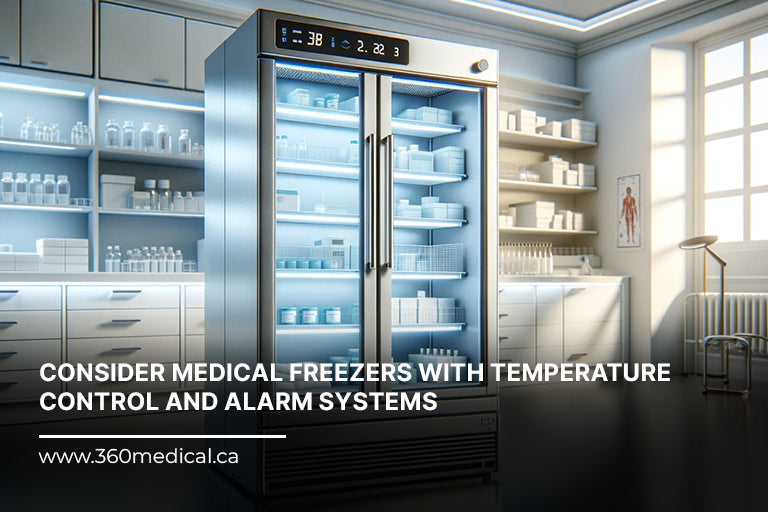Why it is Essential to Choose the Right Medical Fridge

Choosing the right refrigerator for your clinic is a crucial choice that affects not only the preservation and storage of medications and vaccines but also guarantees adherence to regulatory standards. This in-depth guide will help you identify the essential factors to consider when choosing the best medical refrigerator for your clinic's needs.
Importance of a Medical Fridge
Medical fridges are designed to maintain a consistent temperature, crucial for storing sensitive medical supplies like vaccines, blood samples, and certain medications. Unlike standard refrigerators, they provide precise temperature control to ensure the efficacy of stored items.
- Preservation of Vaccines
A medical fridge plays a pivotal role in preserving vaccines at the required temperatures, typically between 2°C and 8°C. This ensures the effectiveness of vaccines and prevents spoilage, ultimately safeguarding public health.
- Blood Sample Integrity
Medical fridges maintain consistent temperatures necessary for storing blood samples and other diagnostic specimens. This temperature stability prevents degradation and ensures accurate test results, critical for patient diagnoses and treatment.
- Medication Efficacy
Certain medications, such as insulin and some antibiotics, require specific temperature ranges for optimal efficacy. Medical fridges maintain these precise conditions, preventing potential harm to patients.
- Compliance with Regulations
Medical fridges are designed to meet stringent healthcare regulations. Compliance ensures that clinics and healthcare facilities maintain the quality and safety of stored medical supplies.
- Minimizing Wastage
By preventing spoilage and degradation, medical fridges help reduce the wastage of expensive vaccines and medications, ultimately saving costs for healthcare providers.
- Emergency Preparedness
Medical fridges equipped with alarm systems and backup power sources ensure that critical medical supplies remain viable during power outages or emergencies, allowing healthcare facilities to continue functioning effectively.
How to Choose the Right Medical Fridge

Here are some essential tips and criteria for selecting a medical fridge to help you make an informed decision when choosing the perfect refrigerator for your clinic:
- Size and Capacity: Consider the quantity and types of items you need to store. A larger clinic with a high patient turnover might require a fridge with a higher capacity to accommodate vaccines, medications, and blood samples efficiently. On the other hand, smaller clinics or specialized practices might opt for a compact model to conserve space and energy.
- Temperature Requirements Different medical supplies come with specific temperature requirements. For example, vaccines are highly sensitive and typically require storage between 2°C and 8°C to maintain their potency. It's crucial to ensure that the medical fridge you choose can consistently and accurately maintain these necessary temperatures to safeguard the effectiveness of your supplies.
- Space Considerations: Before selecting, measure the area where you plan to place the medical fridge. Take into account not only the physical dimensions of the fridge but also the need for adequate ventilation space around it. Additionally, consider the ease of access for healthcare staff to retrieve items efficiently without disrupting the clinic's workflow.
Ensuring that the medical fridge complies with relevant healthcare regulations and standards is paramount. Adherence to these guidelines is essential for accreditation, quality control, and patient safety. It is imperative to verify that the chosen fridge meets all the specific requirements outlined by regulatory bodies, such as the Public Health Agency of Canada or the World Health Organization, to guarantee the safe storage of vaccines and medications.
Thoroughly assess the maintenance requirements of the medical fridge you are considering. Some models may require frequent servicing, while others are designed for minimal maintenance. Understanding the maintenance needs can help you plan for ongoing operational costs and ensure the longevity of the fridge.
Check the warranty terms offered by the manufacturer or seller. A reliable after-sales service and an extended warranty period can be significant advantages. These provisions can offer peace of mind, knowing that any unforeseen issues or malfunctions will be promptly addressed without incurring additional expenses.
Look into the reputation of the brand that manufactures the medical fridge. Established and reputable brands often prioritize quality and reliability in their products. A well-regarded brand is more likely to produce medical fridges that meet stringent healthcare standards.
Seek reviews and feedback from healthcare providers who have experience with the specific medical fridge you are considering. Their firsthand experiences can offer insights into the fridge's performance, durability, and suitability for medical settings.
Although cost is a consideration, it should not be the sole determining factor. It's essential to prioritize quality and functionality when investing in a medical fridge. Investing in a high-quality medical fridge that meets all your requirements is crucial for the safe storage of sensitive medical supplies. Cheaper models might seem attractive initially, but they may cost more in the long run due to maintenance issues, inefficiency, or the need for premature replacement.
Key Features to Look For

There are several factors to consider when choosing a clinic fridge. Here are some must-have features to look for:
- Temperature Stability and Uniformity
The temperature stability and uniformity of a medical fridge are paramount. Look for fridges equipped with advanced temperature control systems that minimize fluctuations. Consistency in maintaining the required temperature range is crucial for preserving the efficacy of vaccines, medications, and sensitive samples.
- Alarm Systems
Alarm systems are essential to safeguard the contents of the medical fridge. These alarms should be sensitive to temperature deviations, power failures, and instances when the door is left ajar. Immediate alerts enable prompt corrective actions, preventing the spoilage of valuable supplies and ensuring patient safety.
- Digital Temperature Display and Monitoring
Digital temperature displays enhance ease of use and monitoring. Additionally, consider models that offer remote monitoring capabilities. Advanced fridges can send alerts to healthcare providers or facility managers in real-time, allowing for a swift response to any temperature irregularities or issues, even when they are not on-site.
- Energy Efficiency
Opting for an energy-efficient medical fridge not only reduces operational costs but also minimizes environmental impact. Look for fridges with Energy Star ratings or similar certifications. These models are designed to consume less energy while maintaining optimal temperature conditions, contributing to sustainability efforts and cost savings.
- Adjustable Shelving and Storage Options
Another valuable feature to consider is adjustable shelving and storage options. Flexibility in configuring the interior space allows for efficient organization of various-sized medical supplies. Some fridges offer removable shelves or compartments that can accommodate larger items or adapt to changing storage needs, ensuring maximum utility of the available space.
Selecting the appropriate medical refrigerator involves balancing multiple factors including size, temperature stability, features, compliance, and cost. By carefully assessing your clinic's needs and researching the available options, you can ensure that you choose a fridge that reliably preserves vital medical supplies and complies with healthcare standards. The investment in a quality medical fridge is an investment in patient safety and the effective operation of your clinic.
If you are looking for an efficient and durable medical refrigerator for vaccines and other supplies in Canada, consider 360 Medical. Check our product list or call us at 1-800-209-2082 to learn more.





Leave a comment